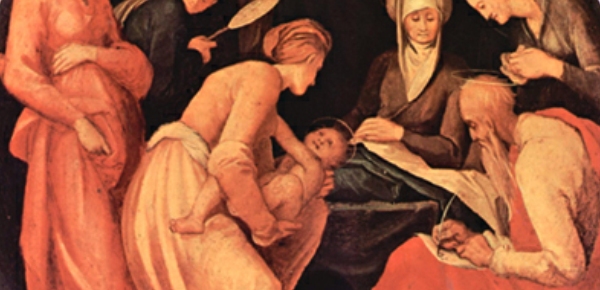
Ok, now I know why people take years to write commentaries. Because that’s the sort of time it would take to give the attention to the Scriptures that they deserve.
I don’t have that sort of time. Not now, and not in the foreseeable future.
So in order to finish this project in a timely manner (end of summer), we’re going to need to move things along. At least for a while, I’ll be shooting for breadth and not depth.
The remainder of Luke 1 narrates the angel’s appearance to Mary, Mary’s visit with Elizabeth, Mary’s song, John’s birth, and Zechariah’s song (which will be followed by Jesus’ birth in chapter 2).
You may have noticed them already, but there are some obvious parallels going on with John’s and Jesus’ stories.
Like John’s conception, Jesus’ conception is miraculous, but to an even greater extent. In fact, in some ways, Mary/Jesus’ story is meant to be an intensification, a “one-upping” so to speak, of Zechariah/John’s story.
Mary’s response to the angelic visitation is one of belief and humble obedience, while it seems that Zechariah’s was one of disbelief and doubt.
Mary’s Song comes in advance of Jesus’ birth. While Zecharaiah’s is a response to John’s birth. Of course, you could make a pretty good argument that Zecharaiah couldn’t sing a song because he couldn’t speak at all. Nonetheless.
John’s birth is a fairly short narrative. Jesus’ will occupy all of chapter 2. None of this is meant to diminish who John was as a person, but is perhaps a technique that Luke is employing to highlight the even greater significance of who Jesus is. A point that John himself would make in chapter 3.
The reason I bring all of this up is to help us be continually reminded that Luke is indeed crafting a story. That doesn’t mean that these things didn’t happen. I certainly believe they did. It does mean that Luke isn’t “reporting” events in television reporter kind of way (although, truth be told, television reporters are telling a story, as well). Luke has a mind for sequencing, scene changes, emphasizing certain things, while ignoring others.
And it is a story that has been well thought through. It is a big story that tells the grand narrative of God at work throughout all history, and particularly the promises made to God’s people throughout the ages. However, against the backdrop of this big picture, we have individuals – “little people” – whose own dreams and hopes and actions matter. An old couple who may have longed for children all their lives are visited by God. A young couple of humble means fearful about what the future holds who are entrusted with carrying God’s Son.
God is moving his huge over-arching cosmic purposes forward. But that doesn’t mean that the details of our comparably small and insignificant lives are overlooked in the process. In God, everything matters. Global hunger and our next meal. Ecological meltdown and our very next breath. The witness of the Church universal and my next act of kindness.
And of course, the large and the small are inevitably intertwined.
God’s grand story and our small story? Equally so.

